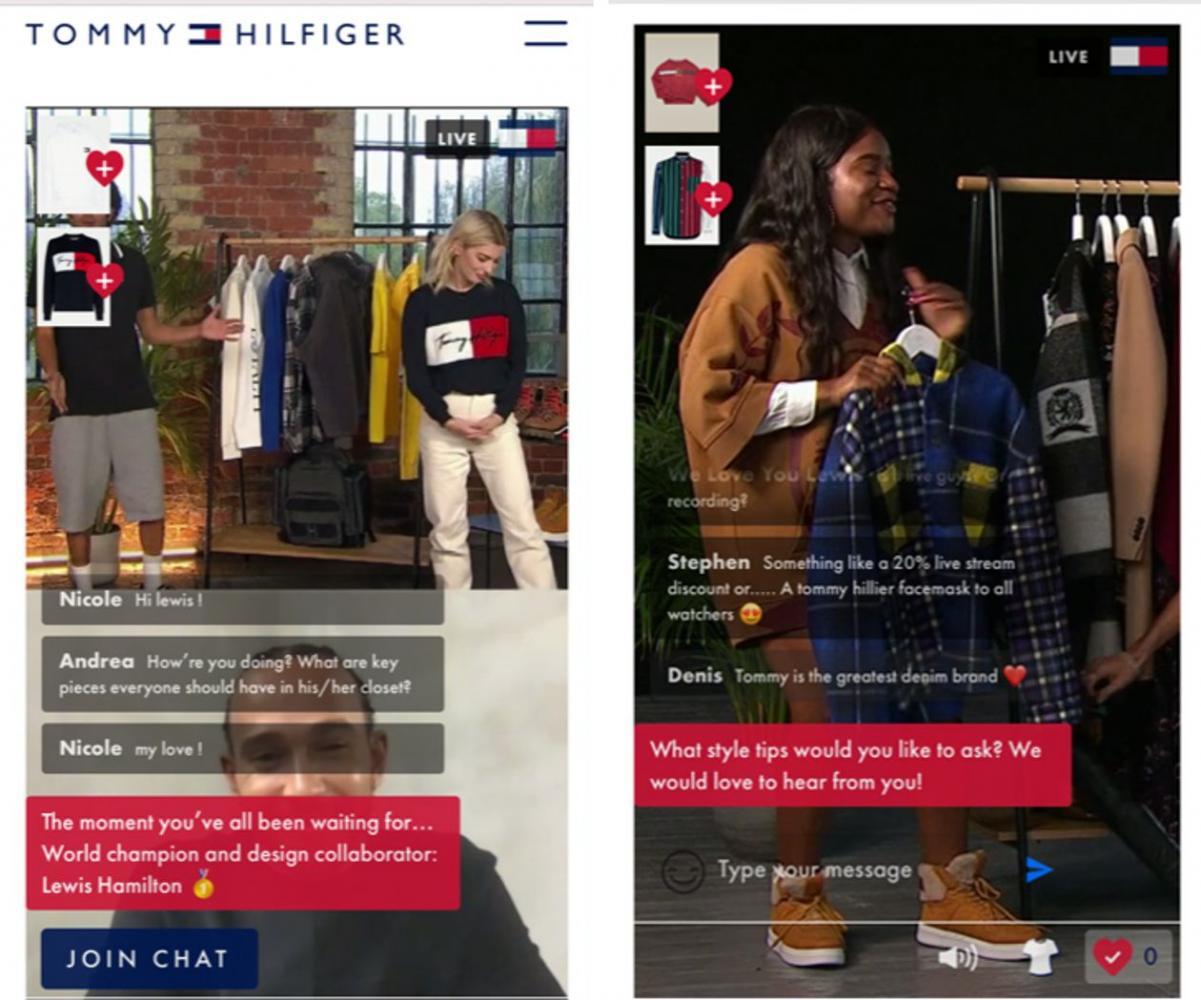To get homebound shoppers to splurge, some brands are copying QVC.

A Tommy Hilfiger live shopping event.
On a recent afternoon, more than 12,600 viewers tuned in to Tommy Hilfiger's website to watch models, influencers and celebrities talk about the brand's fall collection.
"You've got this piece here, which is super, super dope," said Toni-Blaze Ibekwe, a stylist and editor of Wonderland magazine, showing off a blue and white sherpa jacket made from recycled fabric.
Retailers are trying to appeal to consumers who long turned up their noses at QVC and the Home Shopping Network. Brands like Tommy Hilfiger and Levi Strauss hope shoppers who are still reluctant to visit stores can be persuaded to tune in to the live-streamed online sales events and spend on ruffled blouses, handbags and other nonessential items ahead of the holiday shopping season.
During the 30-minute to one-hour sessions, which have taken off in China but are relatively new to the U.S., shoppers are shown a variety of products and are given tips on how to wear them. They can ask questions of the hosts and make purchases, much as they would in a store.
"It was a cool way to check out trends for the fall," said Sara Wherrity, who tuned in to the event from her home in Glenmoore, Pa. "I loved the styling advice. It was almost like having a personal shopper."
The 33-year-old sales manager for a cosmetics maker said she had her eye on some jackets and sweaters, but is holding off on buying clothes for herself until she gives birth in November.
Viewers were able to chat with the presenters during the event and click on items to add them to a virtual shopping cart for purchase.
Michael Scheiner, Tommy Hilfiger's chief marketing officer, said a lot of viewer questions were about the trend toward casual dressing.
"How do you style clothes you would normally be embarrassed to wear outside your home?" he said.
Coresight Research predicts live-stream shopping events in the U.S. will generate $25 billion in sales by 2023.
The streamed events are already a big business in China. A Tommy Hilfiger live-stream show in China in August attracted 14 million viewers and sold out of 1,300 hoodies in two minutes, according to Mr. Scheiner.
Amazon.com Inc., Facebook Inc. and Instagram have also launched or are testing live sales platforms. Levi Strauss & Co., which has been hosting live events on Amazon since 2018, is preparing to stream a live show this month during Prime Day as a way to stand out during a busy shopping event, according to Kelly Mason, a company spokeswoman.
Designer Rebecca Minkoff hosted her first such event on Instagram in April, when her stores in New York and Los Angeles were temporarily closed.
"Once lockdown occurred, the ability to touch and feel disappeared. We wanted to try to give women that experience online," said Ms. Minkoff, who has since hosted multiple streaming events.
Some retailers say live selling can make it easier for online shoppers to figure out which items will look best on them and choose their correct size.
"In a store, you have a sales person, but when you're browsing through products online, you're on your own," said Michael Mente, co-CEO of online clothing retailer Revolve Group Inc. "What the live shows do is import a human element."
Smaller retailers, especially hard hit during the pandemic, are turning to live selling as a way to spur sales and create a sense of community that has been lost during the health crisis.
Sheri and Mic Hensley, who own the Pink Coconut Boutique in Olive Branch, Miss., have been hosting two live-stream events a day on Facebook and their own mobile app since the pandemic started, helping them to more than double sales since January.
"A lot of people think of this as reality TV," Ms. Hensley said. "They love interacting with us."
Ms. Hensley said her streaming events connect people socially at a time of isolation. "There are about 25 women who have become friends through this," she said. "They want us to have a party after Covid so they can all meet each other in person."
"I need my daily fix," said Larita Mathis, a 63-year-old restaurant owner in town, who regularly tunes into the Pink Coconut events. "I'm really busy and the live shows make it easy for me to click, shop, and pay -- all on my phone."
Brandon Kruse, the CEO of CommentSold LLC, which runs live-selling platforms for the Pink Coconut and other retailers, said streaming technology is leveling the playing field between large and small businesses.
"It's a democratized version of the Home Shopping Network," he said. "Anyone can now run their own shopping network out of their home."
The streaming boom is also giving new life to HSN and QVC, which pioneered celebrity-host selling over cable TV in the 1980s. The brands have since rolled out streaming services that include six channels reaching 45 million Roku and Amazon Fire TV customers, and they will soon launch a feature that enables customers to make purchases via text messages.
"All of a sudden live selling is cool," said Mike George, the chief of Qurate Retail Inc., which owns both brands. "In the past, some consumers would say, 'home shopping isn't for me.' What the pandemic has done is to create an opportunity for more people to discover us, because they are at home."
Revenue at Qurate, which also owns the Zulily and Cornerstone brands, bounced back in the second quarter, growing 10% in the three months to June 30, after falling 5% in the first quarter, compared with the same periods a year earlier.
"Consumers are looking for ways to be entertained and be inspired and take their minds off the current challenges," Mr. George said.
